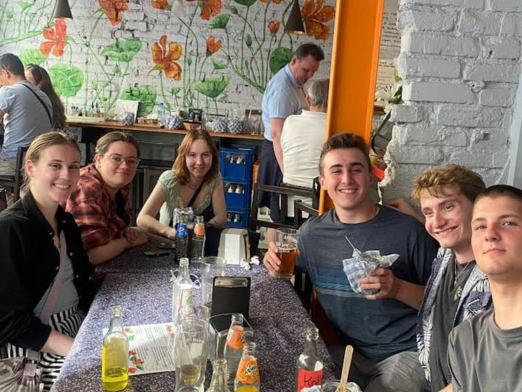Poland gives Ukrainian study abroad program new life
Kalina Broda - 25 July 2023
This past spring, students and instructors of the U of A’s U2 Ukraine program, a study abroad opportunity offered by the Department of Modern Languages and Cultural Studies (MLCS), set off on a unique journey to experience Ukrainian culture firsthand — without setting foot in the country itself.
Instead of landing in Lviv, Ukraine, where the former “Ukrainian Through Its Living Culture” summer program was routinely offered since 2000, the group headed roughly 400 kilometres north, to Poland’s capital city of Warsaw.
“It became impossible to offer the program in Lviv,” says Alla Nedashkivska, the principal coordinator who has led the program for 13 summers. “First it was COVID-19 in 2020, and then the full-scale Russian war broke out against Ukraine. We had no choice but to adapt.”
Warsaw, which is home to a large percentage of refugees who have fled Ukraine, was selected as MLCS’ new destination for the Ukrainian summer program.
“Poland has been one of the most welcoming countries for Ukrainians during the war and was the most logical location for the program,” says Nedashkivska. “We were also able to show our support for our partners in Ukraine and build on the U of A’s existing relationships with Poland.”
The program instructors were also eager to take advantage of dual cultural learning opportunities for students.
“Hosting in Warsaw not only allowed us to continue the life of the program but students were also able to explore another rich culture,” says Dmytro Yesypenko, one of the program’s instructors. “One that’s close to Ukrainian but still different.”
A culture-packed itinerary
During the six-week program, students participated in language and cultural classes held on the University of Warsaw's historic campus, thanks to the guidance of Svitlana Romaniuk, associate dean of the university's Department of Applied Linguistics.
A new course developed by Yesypenko, SLAV 399 (Wars and Peace: 10 Keys to Understanding Polish-Ukrainian Relations) helped bridge students’ understanding of the two countries’ relationship throughout history.
“The course explains the historical complexities between the two countries and their peoples, as well as highlights their shared cultural values and present ties,” says Yesypenko. “I was inspired to create the course after seeing Poland support its neighbours during the ongoing war and offer safety to millions of Ukrainian refugees.”
Students were also encouraged to discover elements of Ukrainian culture embedded throughout the city of Warsaw on various excursions.
Among many outings, highlights included visiting the Ukrains'kyi Dim (the Ukrainian house), an organization assisting Ukrainians/refugees; the renowned POLIN Museum of the History of Polish Jews (as “Polish Jews” includes people living in current Ukraine territory, particularly in Galicia) and attending a painting workshop hosted by the head of the University of Warsaw’s Department of Ukrainian Studies, Dr. Katarzyna Jakubowska-Krawczyk.

“We even had a competition among students and instructors to collect images of all sites, signs and visual texts that relate to the Ukrainian language and/or culture in Warsaw,” says Nedashkivska. “It was a fun educational exploration of Ukraine in Warsaw — I’d say the student experience was near ‘immersive’.”
Of course, sampling plenty of Ukrainian cuisine was one of the favoured highlights on the itinerary as well.
“I was blown away by Warsaw’s Ukrainian restaurants,” says Rachel Matichuk, one of the program’s students.
Yesypenko agrees. “If I need to single out a memory, I would mention our final tasty meeting at Dykanka's varenychna, a dumpling house,” he says. “Even now, I’m smiling thinking about our experience tasting as many types of varenyky-pierogi as possible.”
Overall, both the program instructors and students deemed the adapted program a success.
“It was truly a unique experience and I’ve made new, life-long friends,” says Matichuk. “Being immersed in the culture, despite not visiting Ukraine, made the learning so much more memorable.”
According to Yesypenko, it was clear every person took something different away from the trip:
“Thanks to the program, we all became better, more knowledgeable, flexible and creative versions of ourselves.”
The U2 Ukraine program coordinators would like to express their sincere gratitude to the following institutes and organizations for supporting the program and its students:
At the U of A: Canadian Institute of Ukrainian Studies, Kule Folklore Centre, Department of Modern Languages and Cultural Studies and University of Alberta International
Ukrainian community organizations: Alberta Foundation for Ukrainian Education Society, Alberta Ukrainian Commemorative Society, Ukrainian Foundation for College Education Trust and Ukrainian Canadian Foundation of Taras Shevchenko